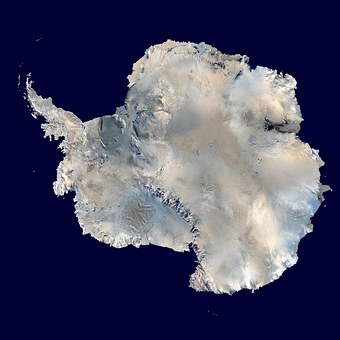
“Journey to the End of the Earth” is an account of Tishani Doshi’s visit to Antarctica, the coldest and most secluded continent in the world. She talks about her experiences there and expresses her views on the issues of climate change and global warming. For her, Antarctica is the link to our history which holds the answers to questions about where humans have actually come from and where we shall eventually head to. With its expansive white landscape and hardly any sign of vegetation or life, this continent is the most pristine place in the world since it is untouched by human civilization.
In this essay, Tishani Doshi also talks about the “Students on Ice” programme that has organised this excursion and how she was a part of the same. She believes that the youth has the power to both understand the problem posed by global warming as well as the ability to take preventive actions for the same. Enraptured by the unblemished beauty of Antarctica, she wonders how climate change will affect it and what will be the overall effect of the same on mankind. After spending time with the young participants of the programme, she is hopeful that they shall be able to make a difference and save the world from the otherwise impending doom.
Journey to the End of the Earth | Summary and Analysis
This essay revolves around the most preserved place in the world, Antarctica, which is the sole unfragmented part of the Gondwana landmass from whose fragments the other continents and countries have emerged. Very few people in the world have had the chance to visit this place, the author being one of those privileged. She had a chance to work with the organisation “Students on Ice” which organises educational trips for students to various ends of the world in order to provide them the opportunity to develop a new insight towards our planet.
As a part of the programme in which the author was working, she had to travel across great distances, via many varying modes of transport, including a Russian research vessel- the Akademik Shokalskiy- before she was finally able to set foot on Antarctica. Upon reaching this continent, she was filled with a sense of relief since the harrowing journey had finally ended. This was followed by wonder and amazement at the vastness and isolation of Antarctica which was, not many centuries ago, the large landmass Gondwana from which the various other continents and countries, including India, were formed. As dinosaurs became extinct and mankind began to evolve, countries and civilisations started taking the shape and form by which we know them today.
So, in this regard, the continent of Antarctica is mankind’s sole link to the past, the present and the future. It holds underneath its surface the proofs of all that had happened over the course of the past millions of years, and the indicators of what might happen in the years to come.
Since the author hailed from India and was quite unused to living in such chilly conditions, the prospect of spending two weeks in Antarctica, a place that is absolutely devoid of all civilization, seemed very daunting. She says that as one sets foot in this continent, one loses all sense of perspective and time that governs the rest of the world. One can see creatures ranging from the microscopic midges and mites to the mighty blue whales. Huge icebergs, some of them being as big as countries, can also be seen. There is 24-hour sunlight and an all-pervading silence which is broken only by the sounds of the occasional avalanches or splitting ice-sheets. Such an environment forces one to look back to the earth’s history and find their place in it as well as think about the future that is to come, which the author believes is not good, especially for humans.
Human civilization has, within a very short span of time as measured on the geological clock, managed to exert its dominance on Nature through its increasing population and the creation of the structures of society such as cities and countries. As a result, the time has come when we have started battling with other species for the limited resources of the earth which has led to increased emissions of the greenhouse gases that causes global warming.
This increase in the average global temperature and the climate change that accompanies it has raised many environmental concerns, especially for Antarctica. This continent holds within its layers of ice half-million-year-old carbon records, the study of which can lead to discoveries about the Earth’s past, present and future. However, global warming has raised serious issues for Antarctica.
The “Students on Ice” programme for which the author was working, aims to inspire high school students to develop a greater understanding of the Earth and take actions towards its conservation. It provides these policy-makers of the future the opportunity to absorb, learn and act towards saving the world.
The programme has garnered immense success and one of the primary reasons behind this is that once one sees the impact of climate change on Antarctica, with polar ice-caps melting in front of their eyes, they realise the true extent of the threat posed by global warming. This continent with its simple ecosystem and lack of biodiversity shows the true picture of the huge repercussions of the little changes that occur in the environment. Through the example of phytoplankton, the author says that if we take care of the small things, the big things will automatically start falling in place.
Throughout her trip to Antarctica, the author had many such epiphanies caused by various incidents that happened during it, including walking on the ocean and experiencing its stark whiteness underneath which they saw the life that thrived therein. Such incidents made the author realise that everything on the earth is connected to one another.
Even after her trip ended she continued to wonder about the beauty of the balance that exists on our planet. She also thinks about what the future has in store for mankind, whether Antarctica would once again become warm or not and whether humans would exist to witness the same or not. However, even as she is sceptical about the future we are heading towards, she finds solace as she remembers the idealism of the children that accompanied her on this trip and holds the optimistic belief that a lot can happen over the course of time, with even a single day making a huge difference.
Journey to the End of the Earth | About the Author
Tishani Doshi is an Indian poet and journalist who won the Forward Prize in 2006 for her debut poetry book “Countries of the Body”. She has received great acclaim in the field of creative writing and is the recipient of several prestigious awards as well. Her publications include six books of poetry and fiction and her essays, poems and short stories have also been widely anthologized.


